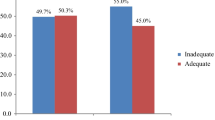Abstract
Background
The disparity between current evidence and practice on active management of third stage of labour (AMTSL) demands assessment of providers’ knowledge on the subject.
Objective
To assess the level and determinant(s) of accurate knowledge of obstetric providers regarding AMTSL.
Methods
Questionnaire-based survey of 361 labour and delivery professionals in public tertiary obstetric centres in southwest Nigeria.
Results
Female nurses at different cadres accounted for most of the respondents. Majority (90.6%) of the respondents reported being aware of AMTSL as an obstetric intervention and 49.7% were aware of FIGO/ICM recommendation on AMTSL. Out of 13 potential third stage interventions, 102 respondents (28.3%) correctly and exclusively identified the components of AMTSL as defined by FIGO/ICM. Many procedures reserved for treatment of complicated third stage of labour such as manual placental removal (37.7%), blood transfusion (20.2%), bimanual uterine compression (24.7%) and uterine artery ligation (13.9%) were also selected as AMTSL components. Multivariate logistic regression analysis indicated that being in administrative position (adjusted OR: 2.68; CI 1.19–6.02) and frequent compared to rare or no consultation of books, journal and internet sources for information (adjusted OR: 2.58; CI 1.21–5.52) increased the odds of having accurate knowledge of AMTSL while being a nurse/midwife (adjusted OR: 0.15; CI 0.05–0.39), matron (adjusted OR: 0.25; CI 0.08–0.79) or intern (adjusted OR: 0.07; CI 0.01–0.29) compared to postgraduate resident doctors reduced the odds of having accurate knowledge of AMTSL.
Conclusion
AMTSL was a familiar but poorly understood intervention among obstetric care providers in this region. Improvement in healthcare quality and practitioners’ adherence to recommended guidelines on AMTSL urgently requires educational interventions that target those who provide routine delivery care and organisation of the health care delivery system in such a way that enables providers to act on acquired knowledge.


Similar content being viewed by others
References
Abou Zahr C (1998) Antepartum and postpartum haemorrhage. In: Murray CJ, Lopez AD (eds) Health dimensions of sex and reproduction: the global burden of sexually transmitted diseases, HIV, maternal conditions, perinatal disorders, and congenital abnormalities. Harvard University Press, Boston, pp 172–174
Zhu L, Qin M, Du L, Jia W, Yang Q, Walker MC, Wen SW (2009) Comparison of maternal mortality between migrating population and permanent residents in Shanghai, China, 1996–2005. BJOG 116(3):401–407. doi:10.1111/j.1471-0528.2008.01979.x
International Confederation of Midwives, International Federation of Gynaecology, Obstetrics (2003) International joint policy statement: management of third stage of labour to prevent postpartum haemorrhage. J Obstet Gynaecol Can 25(1):952–953
International Confederation of Midwives, International Federation of Gynaecology, Obstetrics (2004) International joint policy statement: FIGO/ICM global initiative to prevent postpartum haemorrhage. J Obstet Gynaecol Can 26(12):1100–1102
World Health Organization (2000) managing complications in pregnancy and childbirth: a guide for midwives and doctors. WHO Department of Reproductive Health and Research, Geneva. WHO/RHR/00.7
Kongnyuy EJ, Mlava G, van den Broek N (2009) Facility-based maternal death review in three districts in the central region of Malawi: an analysis of causes and characteristics of maternal deaths. Womens Health Issues 19(1):14–20. doi:10.1016/j.whi.2008.09.008
U.S. Agency for International Development (2006) Prevention of postpartum haemorrhage initiative, support, analysis and research in Africa. Facility-based management of third stage of labour and community perception and actions on postpartum haemorrhage: findings from a national survey in Tanzania. Washington DC USA
Festin MR, Lumbiganon P, Tolosa JE, Finney KA, Ba-Thike K, Chipato T et al (2003) International survey on variations in practice of the management of the third stage of labour. Bull World Health Organ 81:286–291
Winter C, Macfarlane A, Deneux-Tharaux C, Zhang WH, Alexander S, Brocklehurst P, Bouvier-Colle MH, Prendiville W, Cararach V, van Roosmalen J, Berbik I, Klein M, Ayres-de-Campos D, Erkkola R, Chiechi LM, Langhoff-Roos J, Stray-Pedersen B, Troeger C (2007) Variations in policies for management of the third stage of labour and the immediate management of postpartum haemorrhage in Europe. BJOG 114(7):845–854. doi:10.1111/j.1471-0528.2007.01377.x
World Health Organisation (2007) WHO recommendations for the prevention of postpartum haemorrhage. WHO Department of Reproductive Health and Research, Geneva
Centers for Disease Control and Prevention (CDC) (2002) World Health Organization: Epi Info 2002. In: Database and statistics software for public health professionals Atlanta, Georgia, USA. Centers for Disease Control and Prevention
Acknowledgments
The authors are indebted to all maternity care providers who took part in this study. The contributions of Dr. O. Ayoola-Sotubo (OOUTH), Dr. B.A. Olofinbiyi, Dr. A. Adewumi (OAUTHC), Dr. Y. Oshodi, Dr. A. Adegboyega (LASUTH), Dr. O. Atanda (LAUTECHTH), Dr. O. Bamgbopa (FMC), Dr. O.M. Akindele, Dr. A.A. Okunowo (OAUTHC), Mrs. Greene, Mrs. Ajai and Mrs. Afolabi (UCH) with respect to coordination of data collection are hereby acknowledged.
Conflict of interest statement
I certify that there is no actual or potential conflict of interest in relation to this article.
Author information
Authors and Affiliations
Corresponding author
Rights and permissions
About this article
Cite this article
Oladapo, O.T., Fawole, A.O., Loto, O.M. et al. Active management of third stage of labour: a survey of providers’ knowledge in southwest Nigeria. Arch Gynecol Obstet 280, 945–952 (2009). https://doi.org/10.1007/s00404-009-1036-x
Received:
Accepted:
Published:
Issue Date:
DOI: https://doi.org/10.1007/s00404-009-1036-x




